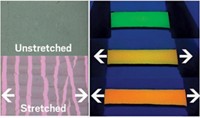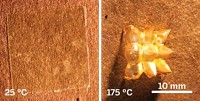Advertisement
Grab your lab coat. Let's get started
Welcome!
Welcome!
Create an account below to get 6 C&EN articles per month, receive newsletters and more - all free.
It seems this is your first time logging in online. Please enter the following information to continue.
As an ACS member you automatically get access to this site. All we need is few more details to create your reading experience.
Not you? Sign in with a different account.
Not you? Sign in with a different account.
ERROR 1
ERROR 1
ERROR 2
ERROR 2
ERROR 2
ERROR 2
ERROR 2
Password and Confirm password must match.
If you have an ACS member number, please enter it here so we can link this account to your membership. (optional)
ERROR 2
ACS values your privacy. By submitting your information, you are gaining access to C&EN and subscribing to our weekly newsletter. We use the information you provide to make your reading experience better, and we will never sell your data to third party members.
Materials
Light-Driven Pulleys Turn Plastic Motor
June 23, 2008
| A version of this story appeared in
Volume 86, Issue 25

Tomiki Ikeda at the Tokyo Institute of Technology and colleagues have developed the first plastic motor powered only by light (Angew. Chem. Int. Ed. 2008, 47, 4986). The researchers used an organic-dye-based material to convert light energy directly into mechanical work without the aid of batteries or electric wires. To test whether the material could turn a homemade, millimeter-sized two-wheel pulley system, the researchers made a polyethylene belt and coated it with the material, which is a cross-linked liquid-crystalline elastomer that contains photochromic azobenzene dyes. The material reversibly expands or contracts when illuminated, depending on the wavelength of the light. Simultaneously applying ultraviolet and visible light to different points on the belt changed the belt's shape and rotated the pulley wheels; shutting off the light stopped the motion. Other photochromic polymers can bend or expand, but they can't undergo that type of continuous, complex three-dimensional movement, the researchers note. Ikeda suggests that the material could be used at various dimensions, ranging from nanoscale motors to the plastic wheels of a passenger car.





Join the conversation
Contact the reporter
Submit a Letter to the Editor for publication
Engage with us on Twitter